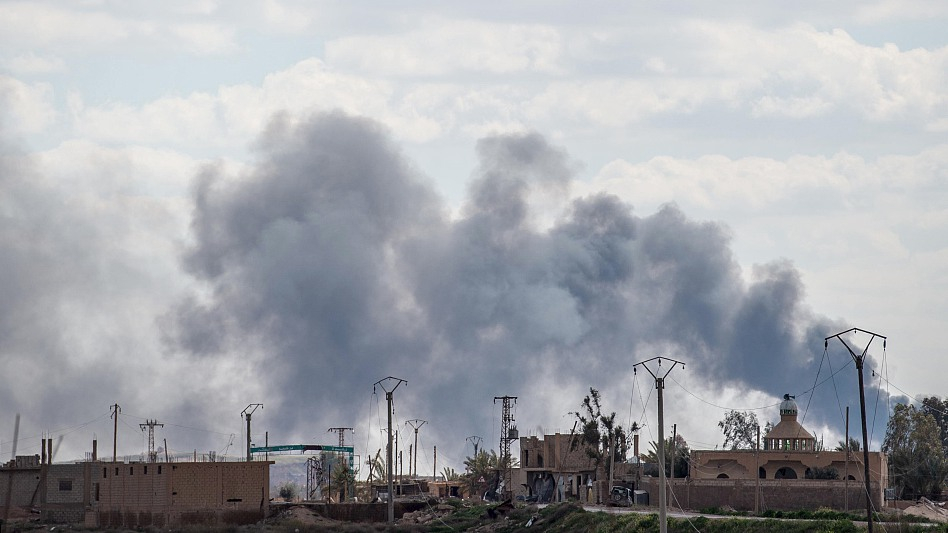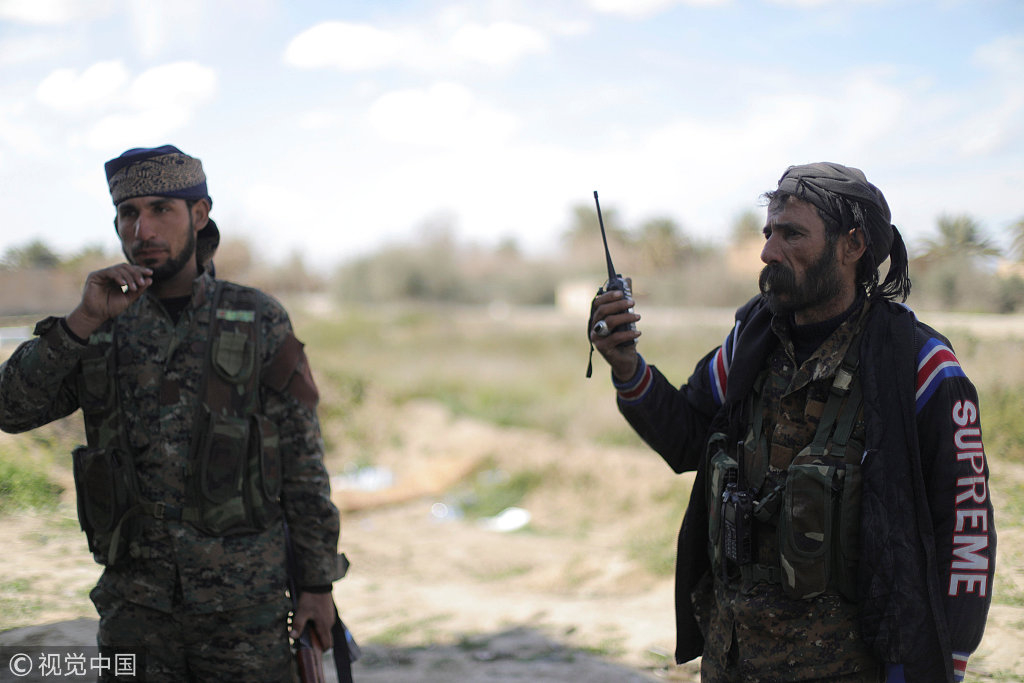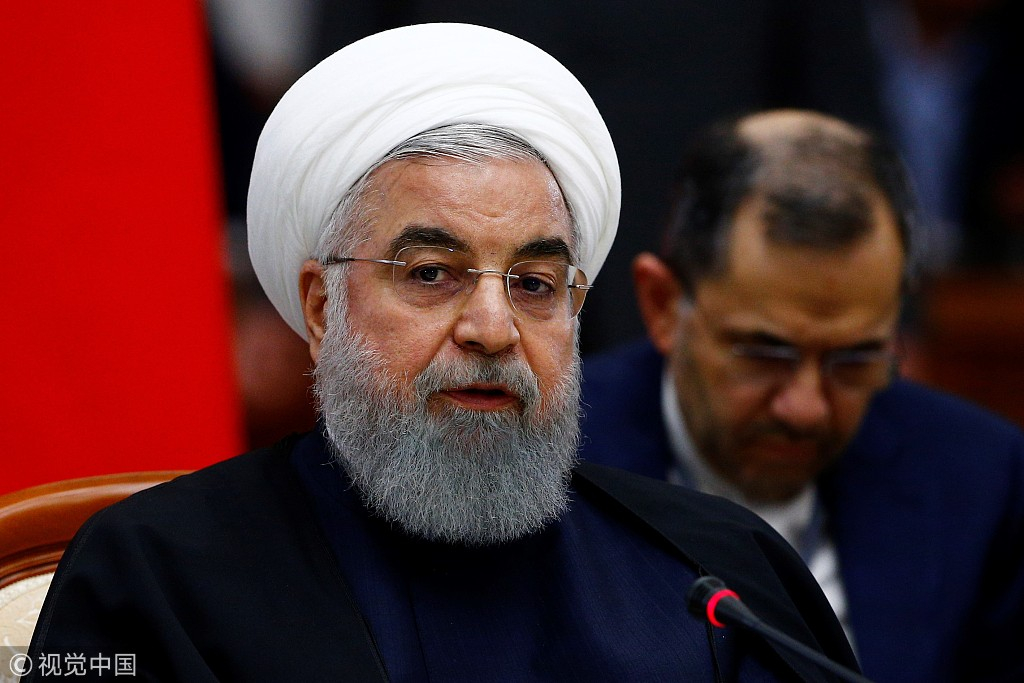
Opinion
11:18, 04-Mar-2019
Opinion: Time for the world to normalize the situation in Syria
Ghanbar Naderi

Editor's note: Ghanbar Naderi is an Iranian journalist, a current affairs commentator, a documentary filmmaker, and a member of the Writers Guild of Great Britain. The article reflects the author's opinion, and not necessarily the views of CGTN.
The U.S.-backed Syrian Democratic Forces (SDF) are reportedly putting the last nail in the coffin of ISIL goons in their last pocket of control in eastern Syria.
The goal is to repel the medieval "caliphate" that once took large swathes of land in Iraq and Syria, and destabilized the planet. And the plan is to declare victory within days.
Here, the argument is not that the fall of Baghouz, a village on the eastern bank of the Euphrates River near the Iraqi border, would mark a milestone in the campaign against the jihadists. The question, as well, is not to ask who did really liquidate the hotbed of international terrorism in Syria – the U.S. and the SDF or the allied forces of Russia, Syria and Iran? It is this: How to help keep Syria as a unitary state per fundamental norms of international law and the United Nations (UN) Charter?
Darker clouds still loom on the horizon
Despite the news from Baghouz, Syria is still facing a humanitarian crisis. Millions of people are refugees, asylum seekers, internally displaced, and stateless. They are exposed to tragedies from all sides. Food and water shortages, lack of international aid, terrorism and violence add to this complexity.

A fighter of Syrian Democratic Forces (SDF) holds a walkie-talkie in Baghouz, Deir Al Zor province, Syria, March 3, 2019. /VCG Photo
A fighter of Syrian Democratic Forces (SDF) holds a walkie-talkie in Baghouz, Deir Al Zor province, Syria, March 3, 2019. /VCG Photo
It gets worse to hear that the U.S., which claims to have a long history of global humanitarian leadership, has no intention to help post-conflict Syria. U.S. President Donald Trump says he wants U.S. troops out of the land of "sand and death." His administration is dragging Syria even further – boycotting international meetings on the refugee crisis, dismissing the Iran-Russia-Turkey peace talks (Astana Process), and forcing regional Arab allies not to fund Syria to rebuild itself.
This is while the Astana Process is only there to promote political settlement with the opposition, including the SDF. The talks based in the Kazakh capital of Astana are aimed at reinforcing, rather than undermining, the parallel UN peace process in Geneva. The stance is: No one can normalize the situation in Syria unless all parties to the conflict are on board.
Indeed, the parties to the conflict cannot turn their back on their global humanitarian commitments, and the UN must push back against efforts to do so. This is a moral imperative, but it is also a practical one: Peace, security and prosperity in Syria serve vital U.S. interests, not only protecting its citizens from the dangers of pandemics and disruptions of mass refugee movements, but advancing the vital security interests of its European allies.
Need for proactive policy
The UN should adopt a proactive policy to ensure long-term normalization of the situation in post-conflict Syria. This could come with the help from China, Russia, the UK, France and the U.S. – permanent members of the UN Security Council. They have political clout and are able to get other members on board.

Iranian President Hassan Rouhani speaks during a meeting with Turkish President Recep Tayyip Erdogan (not pictured) and Russian President Vladimir Putin (not pictured) on Syria in Sochi, Russia, February 14, 2019. /VCG Photo
Iranian President Hassan Rouhani speaks during a meeting with Turkish President Recep Tayyip Erdogan (not pictured) and Russian President Vladimir Putin (not pictured) on Syria in Sochi, Russia, February 14, 2019. /VCG Photo
In parallel, the UN needs to dedicate far more resources and diplomacy to the humanitarian-response system, while spending allocated international funds for reconstruction in more effective ways. This means recognizing that the Syrian government on the front line of the crisis is the best responder. International aid needs to be channeled through the state and local companies. Without involving and empowering them, no foreign aid can address the dynamics of governance and equitable reconstruction.
The political interpretation is that the government wants an end to the conflict. No official has ever said that Damascus plans to allow Iranian and Russian forces to remain indefinitely. Lost in the discussion is that Iran has no military base in Syria. It's not in its interests. These dark imaginings are there to ensure a prolonged conflict, internal divisions, and deeper distrust at the UN. With countless incredibly complicated geopolitical factors at play, Iran doesn't want to be on the hook for when the war inevitably turns into a quagmire costing it blood and treasure – just like every single war the U.S. has been involved in has been for the last decade and a half.
For all intents and purposes, concerned governments and global citizens should never allow any chance of renewed violence and division, nor should they ever let reconstruction efforts and plans result in an open-ended military occupation and dominance by any country. This could tip the scale toward Syria, rendering it virtually impervious to external pressure and influence.
Much has been accomplished since last year in the global campaign against terrorism in Syria. The eastern village of Baghouz will be liberated, too. It is now up to the global community to normalize the situation, complete the political settlement process, create conditions for the return of refugees, and herald reconstruction support and funds. It should go without saying that the people of Syria, as well, must be allowed to determine their own political future.
(If you want to contribute and have specific expertise, please contact us at opinions@cgtn.com.)

SITEMAP
Copyright © 2018 CGTN. Beijing ICP prepared NO.16065310-3
Copyright © 2018 CGTN. Beijing ICP prepared NO.16065310-3